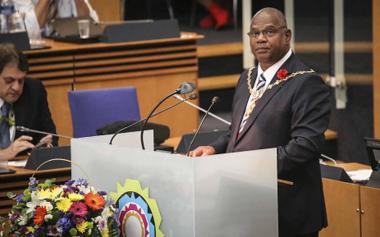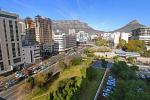City of Cape Town's R50 billion 2019/2020 budget
 Mayor Dan Plato said the budget was geared towards improving safety, urban renewal and human settlements.
Mayor Dan Plato said the budget was geared towards improving safety, urban renewal and human settlements.
The Cape Town council has approved a budget of just over R50 billion for the 2019/2020 financial year.
Mayor Dan Plato said the budget was geared towards improving safety, urban renewal and human settlements.
“There’s something for everyone in the budget, housing for instance. Over R800 million for new housing and informal settlement upgrades has been budget for,” Plato said.
Over the next three years, almost R2.7 billion will go towards human settlement upgrades in the metro, the council said.
With the emphasis on improving public transport, R2.9 billion will be spent on transport upgrades over the same period. About R535 million has been earmarked for the safety and security directorate.
The budget was presented and discussed at 27 public meetings across the City of Cape Town and over 4,000 Capetonians gave input.
Since the tabling of the draft budget in March, further analysis has indicated that the City’s cash flow status is stronger than was assumed at the time. This has enabled a number of additional short-term needs to be met, while also enabling a reduction in the borrowing requirements that were set out in the draft Budget.
The operating budget expenditure is now set at R41,8 billion and the capital budget at R8,3 billion, giving an overall expenditure budget of R50,1 billion.
The revenue budget has been contained to R40,9 billion, which is a 4% increase on the previous year’s budget and below the Consumer Price Index, despite the considerable cost pressures on the City.
The borrowing requirement for the three-year budget has been halved from the R14,5 billion that was tabled in March to R7 billion, due to the favourable cash flow projections.
Service charges at a glance:
- The required increase in water and sanitation tariffs has been lowered by subsidising costs to the tune of R200 million from the Equitable Share Allocation and keeping the tariff increase at 9%, which is an increase of R1,23 per 1 000 litres of water
- No increase in the fixed charge for water
- A controlled increase in the electricity tariff of 8,88% (compared to the 15,63% increase in the tariff that the City pays to Eskom for bulk electricity supply). Approximately 65% of the tariff cost is for buying bulk electricity from Eskom
- An increase of 5% for refuse removal services, down from 5,7%
There will be no rates payable for residential properties on the first R300 000 (currently it is R200 000).

















